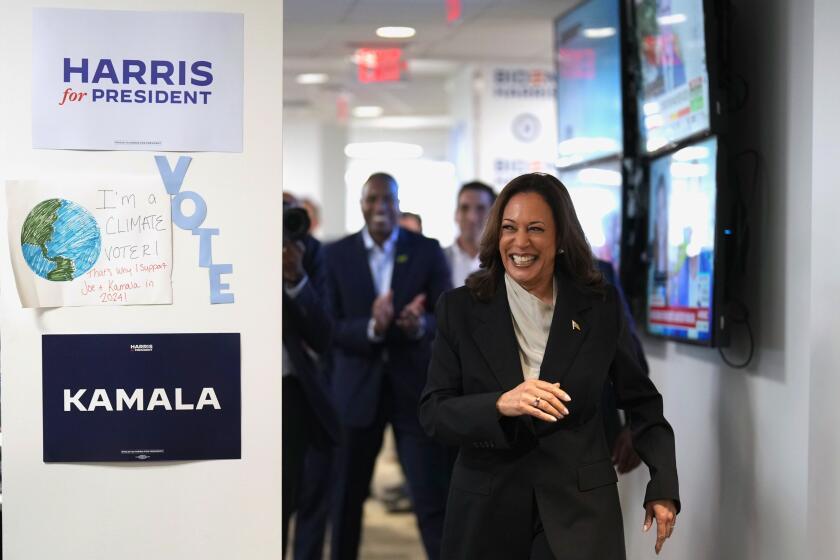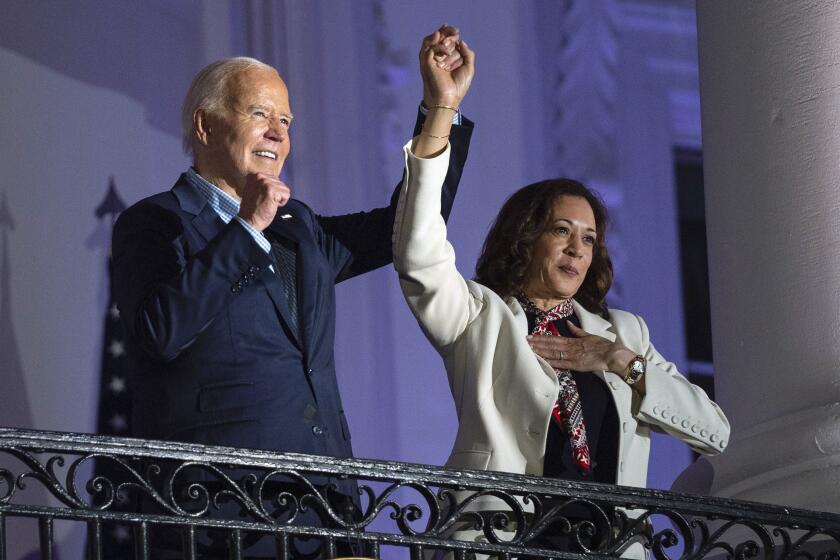Balanced-Budget Amendment Fails in Senate, 64-35
Senate Democrats on Thursday killed a GOP-backed balanced-budget constitutional amendment for the second time in 15 months, dealing Republican presidential candidate Bob Dole a legislative defeat but giving him a fresh campaign issue.
The 64-35 vote fell two short of the two-thirds majority required to approve a constitutional amendment. Twelve Democrats joined all but one Republican in voting for the measure, which would require a balanced federal budget by 2002 but would not specify how it would be achieved.
Many Democrats have said repeatedly that they would vote for the amendment if Republicans agreed to explicit language barring the use of the Social Security Trust Fund surplus to help balance the federal books. But Republicans refused to go along.
Sen. Robert C. Byrd (D-W.Va.), who had led the effort to defeat the measure a year ago, spoke scathingly of it again, calling it a “sham,” particularly when placed alongside GOP calls for an election-year tax cut.
Byrd said that the amendment reminded him of a revival meeting: “Come on in, politicians. Get baptized with the holy water of the balanced-budget amendment and then go on about your business and sin, sin, sin.”
In his closing speech on the issue, Dole said that the amendment was “the single most important thing we can do to ensure the nation’s economic security.” But he and virtually all other lawmakers had known for months that the measure was doomed to defeat.
Dole, the majority leader who is closing out his lengthy Senate career next week, conceded as much before the vote. “It’s not whether you win or lose but whether you’ve made the statement,” he said shortly before the roll was called. And, in an allusion to the upcoming presidential campaign, he said:
“Maybe next year somebody will be there [in the White House] to lobby for it.”
President Clinton called on Dole and the Republicans to enact the deficit cuts agreed on in marathon budget talks that ended inconclusively last year.
“The Congress ought to come back and pass the savings we have in common,” he said, “give the American people a balanced budget, take the differences between us and then take that to the voters in November.”
The day’s events were rich in political theater.
As Dole spoke moments before the balloting began, one Republican senator after another strode into the chamber and quietly took his or her seat. But the Democratic side of the ornate chamber was virtually empty--until a long buzzer finally sounded, signaling the end of the debate and the start of the roll-call vote. Only then did Democratic lawmakers begin streaming into the chamber.
California’s two Democratic senators, Barbara Boxer and Dianne Feinstein, voted against the amendment. The one Republican to vote against it was Mark O. Hatfield of Oregon, who also was the only GOP senator to oppose the measure a year ago when it failed by two votes, 65 to 35.
The defeat was the second legislative setback for Dole this week. On Tuesday, he was forced to shelve a proposal to create a national missile defense system after the Senate refused to cut off a Democratic filibuster.
On another legislative front Thursday, Dole faced an unequivocal setback with the apparent demise of his once-popular proposal to repeal a 4.3-cent-a-gallon gasoline tax increase passed in 1993.
Senate Minority Leader Tom Daschle (D-S.D.) confirmed Thursday that the gas-tax repeal is unlikely to come up before Dole’s resignation from the Senate becomes effective Tuesday afternoon. Dole is resigning so he can campaign for the presidency full time.
And even if the repeal were to come to a vote, Daschle said, “it may not get the 51 votes.”
Dole had viewed his proposal as a gambit that would lend impetus to his campaign--and serve as a prelude to an across-the-board income tax cut plan.
Abetted by voter apathy, declining fuel prices and Democratic skepticism, the repeal has all but vanished from the Senate agenda.
Said Daschle: “I think the longer this thing goes on, the less real interest there is, especially if Sen. Dole is no longer here and it doesn’t appear to be as much a presidential campaign issue.”
The slow, quiet death of the Kansas senator’s gas-tax repeal proposal contrasts sharply with the way the issue surged into prominence two months ago.
After Dole proposed the repeal on a Friday afternoon in late April, the issue rocketed almost overnight to the top of the congressional agenda. The House quickly passed it. And Clinton, who pushed through the 4.3-cent tax increase three years ago, jumped on the bandwagon, saying that he would sign the repeal.
Since then, the issue has steadily waned--to the point where Dole did not even bother to mention it while campaigning in California last week.
Senate Democrats have raised various questions about his proposal, including whether the petroleum industry would pass on savings to consumers and how lost revenues from the tax, estimated at $6 billion a year, would be offset.
Moreover, after Democrats sought to link the repeal to a vote on increasing the minimum hourly wage, the issue quickly became mired in partisan gridlock.
Gas prices, in the meantime, began slowly to drop. Prices actually peaked at a national average of $1.31 a gallon for regular unleaded fuel at the self-serve pump in mid-April--almost two weeks before Dole made his proposal, according to Bill Jackman, a Washington spokesman of the American Automobile Assn. (In California, prices were about 20 cents higher.)
One reason for the price drop was the end of the harsh winter in much of the United States that had driven up demand--and prices--for heating oil. Moreover, the impending influx of up to a million barrels a day of Iraqi crude oil could further cause price declines. Experts predict that prices could fall to $16 a barrel from the current level of $18 to $20.
Daschle also said that he does not expect Dole’s as-yet-unnamed successor as majority leader to revive the issue. “I think that they are going to be wasting a lot of time and probably spending some good political capital on an issue that they don’t need to waste time on,” Daschle said.
More to Read
Get the L.A. Times Politics newsletter
Deeply reported insights into legislation, politics and policy from Sacramento, Washington and beyond. In your inbox three times per week.
You may occasionally receive promotional content from the Los Angeles Times.






